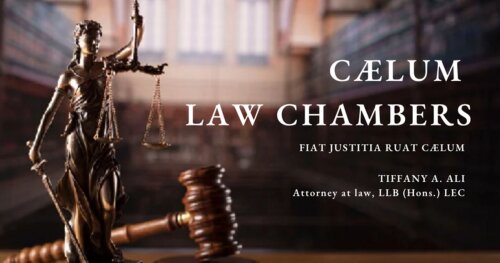Best ADR Mediation & Arbitration Lawyers in Chaguanas
Share your needs with us, get contacted by law firms.
Free. Takes 2 min.
List of the best lawyers in Chaguanas, Trinidad and Tobago
About ADR Mediation & Arbitration Law in Chaguanas, Trinidad and Tobago
Alternative Dispute Resolution, commonly referred to as ADR, encompasses processes such as mediation and arbitration that offer alternatives to settling disputes in court. In Chaguanas and across Trinidad and Tobago, ADR is recognized as an effective, collaborative, and cost-efficient means of resolving conflicts ranging from civil and commercial disputes to family, employment, and community matters. Local institutions and the judiciary encourage parties to consider ADR before, or instead of, traditional litigation, recognizing its benefits in reducing court backlogs while promoting amicable settlements.
Why You May Need a Lawyer
Though mediation and arbitration are designed to be accessible and sometimes less formal than a court trial, legal guidance is often essential for several reasons. A lawyer experienced in ADR can help you evaluate your options, draft or review mediation or arbitration agreements, explain the rights and duties of all parties, and ensure that settlements or awards are fair and enforceable under Trinidad and Tobago law. You may require legal help if:
- You are involved in a commercial dispute with a business or service provider
- You have an employment disagreement, such as wrongful dismissal or workplace conflict
- There are family law issues like property division or child custody matters
- You need to enforce or challenge an arbitration award
- You are unclear about your rights during the ADR process
- You wish to draft an agreement that includes an ADR clause
Local Laws Overview
Trinidad and Tobago’s legal system supports ADR through specific statutes, judicial encouragement, and local and regional ADR organizations. The main legal frameworks are:
- Mediation Act, 2004: Establishes the rules for the accreditation of mediators and the conduct of mediation in civil, commercial, family, and other matters. It recognizes the confidentiality of mediation communications and the enforceability of mediation agreements.
- Arbitration Act, Chapter 5:01: Governs the conduct of arbitration proceedings, the appointment of arbitrators, and the recognition and enforcement of arbitral awards.
- Supreme Court of Judicature Rules (Civil Proceedings Rules): Courts may refer parties to mediation as part of the case management process.
In Chaguanas, ADR services are often accessed through the Mediation Board of Trinidad and Tobago, the Dispute Resolution Centre, or private practitioners who are certified mediators or arbitrators. These services apply to both private disputes and matters already before the courts.
Frequently Asked Questions
What is the difference between mediation and arbitration?
Mediation involves a neutral third party who facilitates a negotiation and helps parties reach a voluntary agreement. Arbitration is more formal, where a neutral arbitrator hears both sides and makes a binding decision.
Are ADR decisions legally binding in Trinidad and Tobago?
Mediation agreements become binding if parties sign a written settlement. Arbitral awards are generally binding and can be enforced in the courts under the Arbitration Act.
Who can be a mediator or arbitrator in Chaguanas?
Mediators and arbitrators are usually accredited professionals recognized by the Mediation Board of Trinidad and Tobago or through reputable organizations. Many are also experienced lawyers.
Is ADR confidential?
Yes, mediation sessions are confidential. Arbitration hearings are generally private, and the outcome is not published unless parties agree.
What types of disputes can be resolved through ADR?
ADR can address business, employment, family, property, construction, consumer, and even some criminal matters, depending on the nature of the dispute.
How long does ADR take?
ADR often resolves disputes more quickly than court cases. Mediation may conclude in one or two sessions, while arbitration can take several weeks or months depending on complexity.
Do I need a lawyer for ADR?
While not mandatory, legal advice is highly recommended, especially for complex or high-value cases. Lawyers ensure your interests are protected and that agreements are legally sound.
Can a court order parties to ADR in Chaguanas?
Yes. Courts in Trinidad and Tobago have the discretion to refer parties to mediation during the litigation process.
What happens if an ADR agreement is breached?
A breached mediation agreement or arbitral award can be enforced by applying to the court for orders to comply or for damages.
How do I start the ADR process in Chaguanas?
You can contact an accredited mediator or arbitrator directly, approach the Dispute Resolution Centre, or ask your lawyer to initiate the process on your behalf.
Additional Resources
If you need further information or support, consider reaching out to the following organizations and bodies in Trinidad and Tobago:
- Mediation Board of Trinidad and Tobago (MBTT): Accredits mediators and oversees the standards of mediation practice.
- Dispute Resolution Centre (DRC): Provides ADR services including mediation and arbitration for a wide range of disputes.
- Trinidad and Tobago Chamber of Industry and Commerce: Offers commercial arbitration and mediation services.
- Supreme Court of Judicature: Provides guidance on ADR procedures within the judicial system.
- Legal Aid and Advisory Authority: Offers legal assistance to eligible persons, including those considering ADR options.
Next Steps
If you believe ADR mediation or arbitration is the right path for resolving your dispute in Chaguanas, take these important steps:
- Consult with a lawyer who has ADR experience to discuss your situation and assess your options.
- Gather all relevant documents and evidence that relate to your dispute.
- Contact an accredited mediator or arbitrator, or approach an established ADR centre such as the DRC.
- Consider whether you and the other party can agree to attempt mediation or whether arbitration is required by a contract.
- If your case is already before the courts, discuss the possibility of court-referred mediation with your legal representative.
- Review any proposed settlement agreements or arbitral awards with your lawyer before signing.
Taking informed action early can often save time, keep costs manageable, and result in fair outcomes for all parties involved. If in doubt, seeking professional legal advice is always recommended.
Lawzana helps you find the best lawyers and law firms in Chaguanas through a curated and pre-screened list of qualified legal professionals. Our platform offers rankings and detailed profiles of attorneys and law firms, allowing you to compare based on practice areas, including ADR Mediation & Arbitration , experience, and client feedback.
Each profile includes a description of the firm's areas of practice, client reviews, team members and partners, year of establishment, spoken languages, office locations, contact information, social media presence, and any published articles or resources. Most firms on our platform speak English and are experienced in both local and international legal matters.
Get a quote from top-rated law firms in Chaguanas, Trinidad and Tobago — quickly, securely, and without unnecessary hassle.
Disclaimer:
The information provided on this page is for general informational purposes only and does not constitute legal advice. While we strive to ensure the accuracy and relevance of the content, legal information may change over time, and interpretations of the law can vary. You should always consult with a qualified legal professional for advice specific to your situation.
We disclaim all liability for actions taken or not taken based on the content of this page. If you believe any information is incorrect or outdated, please contact us, and we will review and update it where appropriate.










